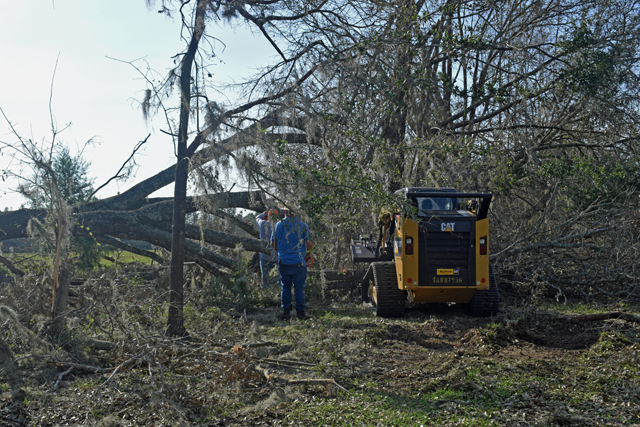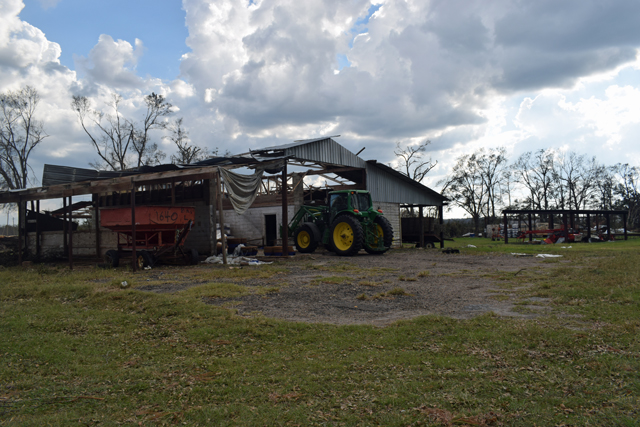There are a variety of programs from the United States Department of Agriculture (USDA) that will be available to help farmers, ranchers, and timberland owners in the counties effected by Hurricane Michael. The majority of the programs are administered through the Farm Service Agency (FSA). The Natural Resources Conservation Service (NRCS) also has programs in place that can benefit landowners recovering from the hurricane. Below are brief descriptions of several of the most pertinent programs. More details on the specific programs are available by viewing the linked fact sheets. These programs will also be explained in detail at a series of producer meetings.
- FSA Livestock Indemnity Program (LIP) – LIP provides benefits to livestock producers for livestock deaths in excess of normal mortality caused by adverse weather or by attacks by animals reintroduced into the wild by the Federal Government. LIP payments are equal to 75 percent of the average fair market value of the livestock. LIP Fact Sheet
— - FSA Emergency Assistance for Livestock, Honeybees, and Farm Raised Fish Program (ELAP) – ELAP provides financial assistance to eligible producers of livestock, honeybees and farm-raised fish for losses due to disease, certain adverse weather events or loss conditions, including blizzards and wildfires, as determined by the Secretary. ELAP assistance is provided for losses not covered by other disaster assistance programs authorized by the 2014 Farm Bill and the Bipartisan Budget Act of 2018, such as losses not covered by the Livestock Forage Disaster Program (LFP) and the Livestock Indemnity Program (LIP). ELAP Fact Sheet
- –FSA Emergency Forest Restoration Program (EFRP) – EFRP provides payments to eligible owners of nonindustrial private forest (NIPF) land in order to carry out emergency measures to restore land damaged by a natural disaster. Available funding for EFRP is determined annually by Congress. EFRP Fact Sheet
— - FSA Tree Assistance Program (TAP) – TAP provides financial assistance to qualifying orchardists and nursery tree growers to replant or rehabilitate eligible trees, bushes and vines damaged by natural disasters. TAP Fact Sheet–
- FSA Emergency Conservation Program (ECP) – ECP helps farmers and ranchers to repair damage to farmlands caused by natural disasters and to help put in place methods for water conservation during severe drought. The ECP does this by giving ranchers and farmers funding and assistance to repair the damaged farmland or to install methods for water conservation. ECP Fact Sheet

The Emergency Conservation program provides cost-share funding to remove debris and repair fences. Credit: Doug Mayo, UF/IFAS
- FSA Emergency Farm Loans – Emergency loans are available to help producers recover from production and physical losses due to drought, flooding, other natural disasters or quarantine. Emergency Farm Loans Fact Sheet
— - NRCS Environmental Quality Incentives Program (EQIP) – Farmers, ranchers, and non-industrial private forestland owners can apply for resource assistance through EQIP. Eligible land includes cropland, rangeland, and non-industrial private forestland. Recovery assistance includes, but is not limited to: immediate soil erosion protection, minimizing noxious and invasive plant proliferation, protecting water quality, restoring livestock infrastructure necessary for grazing management, emergency animal mortality management. EQIP Fact Sheet
If you are interested in participating in any of these programs, the first step is contacting your county’s USDA Service Center and setting up an appointment. Use the Service Center Locator to find the contact information for your Service Center. NOTE: At the time this document was compiled, due to damage to the Blountstown Service Center people from Calhoun, Liberty, Franklin, and Gulf Counties were being directed to the Quincy (Gadsden County) Service Center.
Additional information about federal disaster recovery programs is available at www.farmers.gov.
- Friday Feature:Prosperity on the Modern Farm in 1950 - January 30, 2026
- Ranch Record Keeping for Annual Analysis & Innovation - January 23, 2026
- Friday Feature: 2026 Farm Dog of the Year - January 23, 2026

